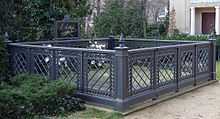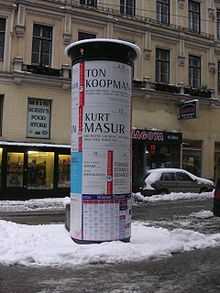Ernst Litfaß
Ernst Amandus Theodor Litfaß (or Litfass; German pronunciation: [ˈlɪtfas]), (February 11, 1816 – December 27, 1874) was a German printer and publisher. His claim to fame rests on the invention of the free-standing cylindrical advertising column which bears his name in German language (Litfaßsäule).

Biography
Born in Berlin, Litfaß took over his stepfather's business in 1845 and became the editor of a number of newspapers and pamphlets. As publisher, he completed, in 1858, the edition of the Oekonomische Encyklopädie (in 242 volumes), which had been started by Johann Georg Krünitz in 1773.
In 1854 Litfaß proposed putting up columns in the streets of Berlin for announcement and advertising purposes. Allegedly, he was disgusted by the unsystematic and ubiquitous posting of pamphlets, notices and other materials on walls, doors, fences and trees. In December of that year he was granted permission to erect such Annoncier-Säulen columns, and on July 1, 1855, the first 100 Litfaß-Säulen were presented in Berlin.
Litfaß had a monopoly on his advertising columns and grew rich fast. After his death in Wiesbaden in 1874, the idea of putting up Litfaßsäulen (Litfaß columns or Litfaß pillars) quickly spread to other German cities. Today, they can be found in other countries as well.

Later developments include the electrically powered slowly revolving Litfaß column; Litfaß columns that serve as vents for underground services; and the Litfaß column with a hidden door whose interior is used for storage purposes (tools for street sweeping, electrical appliances, etc.)
Cultural references
- In the movie The Third Man, Harry Lime (played by Orson Welles) uses one of these columns as an escape route to the sewer system under Vienna.
- In the movie Gremlins 2, Billy Peltzer (played by Zach Galligan) and Daniel Clamp (played by John Glover), use one of these columns as an escape route from the Gremlin infested Clamp Building.
- In the movie Men in Black II, Agent K (played by Tommy Lee Jones) and Agent J (played by Will Smith), use a column as an escape route from an alien infested MiB Headquarters.
Note on the spelling
Litfaß is a proper name and thus not affected by the German spelling reform although the a in Litfaß is a short vowel and the following ß would otherwise have to be turned into an ss. Accordingly, Litfaß is still correct, while Litfass is acceptable in non-German contexts.
See also
Notes
|